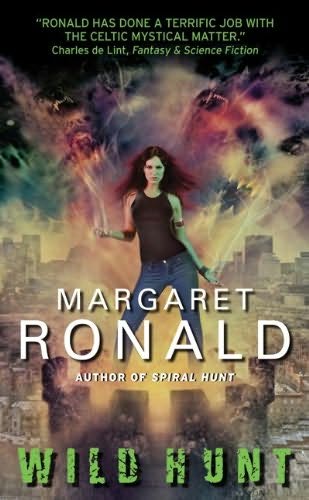It is a truth (nearly) universally acknowledged (by authors) that second novels are harder than first novels. Often, they’re the first book that a writer has to create under deadline pressure, and the additional pressure of public expectation—which can be both ego-crushing and ego-inflating, sometimes simultaneously, and is certainly distracting as all get out.
I remain impressed that anyone can turn in a book under those circumstances. It’s a true trial by fire, and what’s even more amazing is that sometimes people turn in good second novels.
Margaret Ronald’s Wild Hunt is a good second novel.
I don’t think it’s quite as good as the first one—I admit that I lost the plot in one spot, and there’s a thrashy bit towards the end of the first act—but in general, it’s enjoyable, increases the depth of characterization and worldbuilding, and maintains the reader’s appreciation of Ronald’s masterful grasp of folklore. It doesn’t have quite the great sense of place that Spiral Hunt does—Boston is one of my local cities, along with New York, and Spiral Hunt felt like a day trip—but some local landmarks are given a great presence, which makes up for a lot.
Like its prequel, Wild Hunt follows the adventures of Evie Scelan, Hound and bike messenger, in the “undercurrent” (read: mystical underworld) of the city of Boston. Cleanly written and fast-paced, the book takes us through Evie’s seemingly mundane—by her standards—daily routine until it leads her into a convoluted nexus of hundred-and-fifty-year-old plots and betrayals, and power games as well. Her activities in the previous book have left a power vacuum in Evie’s city, and Evie is starting to think that perhaps she should be the one to fill it.
First, however, she must survive attempts on her life, attempts on her bike, obnoxious importunings, a plot complicated enough that by the climax I had lost track of just exactly how everybody had gotten where they were, and Boyfriend Troubles of an epic sort. And, by the end, an encounter with some even more terrible mythological hounds than those of Evie’s own bloodline.
One of the joys of the Evie Scelan books is the secondary characters, and Wild Hunt is not an exception. Her love interest is somebody I actually find engaging (a rarity for me in urban fantasy), her friends are varied and have their own lives and agency, and her enemies and reluctant allies too are redolent of motivation. I particularly enjoyed Elizabeth, in this book—especially in the way Ronald introduces her as a seeming cipher and then opens out Evie’s understanding of her from stereotype to person to reveal something about Evie and something about Elizabeth as well.
I was also entertained by the treatment of the Wild Hunt—specifically, at about the time I started to frown and go, “That’s an awfully cavalier treatment of one of the nastiest manifestations of European mythology,” the story pulled a reversal based on just that fact.
I can tell the book managed to maintain an emotional grip on me, because the personal loss Evie suffers in the denouement saddened me greatly, and I look forward to a book three in which the damaged relationship may be set right.
Wild Hunt is the sequel to Spiral Hunt.
Elizabeth Bear was fortunate enough to have her first three novels all written by the time the first one hit print. Number four, however, nearly kilt her.










